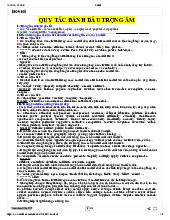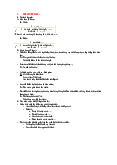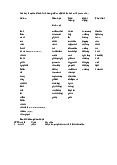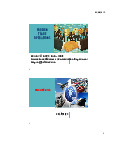

Preview text:
Unit 18: Derivatives
Vocabulary (Ánh Tuyết + Phương Uyên)
1. Derivatives: vốn phái sinh => F are financial instruments whose prices are
dependent upon, or derived from,underlying assets such as stocks, bonds,
commodities, currencies, interest rates and market indices
2. Future: hợp đồng về hàng hóa bàn giao sau=> A a contract agreement to buy or
sell a security, commodity or financial instrumentat a predetermined price, at a
predetermined point in the future
3. Option: quyền mua bán cổ phần=> E offers the buyer the right, but not the
obligation to buy (call option) or sell (put option) an asset at an agreed-upon price
(the strike price), either during certain period of time, or on a specific date.
4. Commodities: hàng hóa => D are raw materials or primary products such as
metals, cereals, coffee, etc., that are traded on special markets.
5. Hedging: phòng ngừa rủi ro => C means making contracts to buy or sell
commodities or financial assets in the future, at a pre-arranged price, as a
protection against price changes.
6. Speculation: đầu cơ => B on the contrary, means buying assets in the hope of
making a capital gain by selling them later at a higher price (or selling them in the
hope of buying them back at a lower price
7. Interest rate swap: hợp đồng hoán đổi lãi suất => H is an agreement to exchange
future interest payments with another company or financial institution, e.g. a
floating rate loan for a fixed interest rate loan.
8. Currency swap: hợp đồng hoán đổi tiền tệ => G is an agreement between two
parties who exchange principal and fixed rate interest payments on a loan in one
currency for principal and fixed rate interest payments on an equal loan in another currency.
Discussion (Ngân Phiếu + Khánh Linh)
1. The cocoa grower who thinks the price might drop could use futures and
derivatives to hedge against potential losses. They could sell cocoa futures contracts,
which would allow them to lock in a specific price for their cocoa harvest in the
future, even if the market price drops. This would protect them from potential losses if
the price of cocoa does indeed decrease.
2. A company with a lot of fixed interest debt that expects interest rates to fall could
use interest rate futures and derivatives to mitigate the risk of rising interest rates.
They could enter into an interest rate swap agreement, where they exchange their
fixed interest rate payments for floating interest rate payments. If interest rates do fall,
the company would benefit from lower interest payments. This would help them
manage their debt obligations more effectively.
3. An investor who expects the price of a stock to fall in the next few weeks or
months could use stock index futures or options to profit from the anticipated decline.
They could sell stock index futures contracts or buy put options on the stock index. If
the stock price does indeed fall, the value of the futures contracts or options would
increase, allowing the investor to sell them at a higher price and make a profit.
4. An investor who expects the price of a stock to rise in the next few weeks or
months could use stock index futures or options to capitalize on the anticipated
increase. They could buy stock index futures contracts or call options on the stock
index. If the stock price does indeed rise, the value of the futures contracts or options
would increase, allowing the investor to sell them at a higher price and make a profit.




